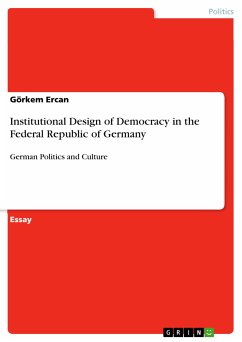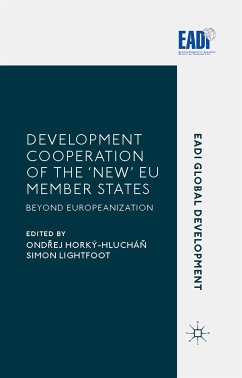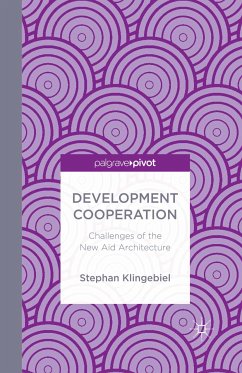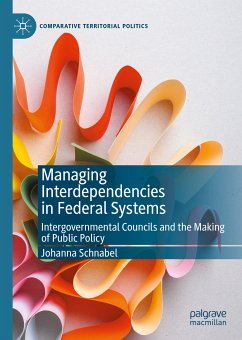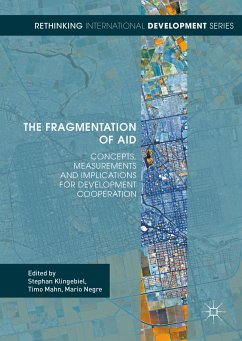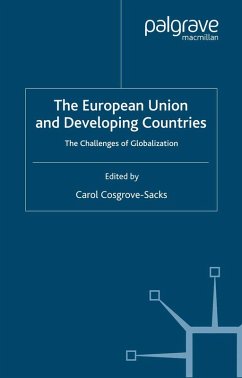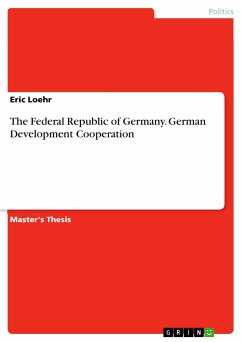
The Federal Republic of Germany. German Development Cooperation (eBook, PDF)
Versandkostenfrei!
Sofort per Download lieferbar
Statt: 47,95 €**
36,99 €
inkl. MwSt. und vom Verlag festgesetzt.
**Preis der gedruckten Ausgabe (Broschiertes Buch)
Alle Infos zum eBook verschenkenWeitere Ausgaben:

PAYBACK Punkte
0 °P sammeln!
Master's Thesis from the year 2023 in the subject Politics - Political Systems - Germany, grade: 1,3, University of Cologne (Cologne Center for Comparative Politics), language: English, abstract: This master's thesis aims to expand the state of research by examining federal-state cooperation in the context of international DC. To this end, the policy field will first be described in terms of its institutional structure. Multi-level governance research as a sub- discipline of political science serves as the theoretical basis for classifying the system. Furthermore, the discussion of governance ...
Master's Thesis from the year 2023 in the subject Politics - Political Systems - Germany, grade: 1,3, University of Cologne (Cologne Center for Comparative Politics), language: English, abstract: This master's thesis aims to expand the state of research by examining federal-state cooperation in the context of international DC. To this end, the policy field will first be described in terms of its institutional structure. Multi-level governance research as a sub- discipline of political science serves as the theoretical basis for classifying the system. Furthermore, the discussion of governance forms, as well as their opportunities and risks, serves as an in-depth description of the relationships between the actors of the system. To contextualise the framework, the theory of federalism is used. In this way, the influence of the prevailing political system can be considered. The FSP is used as a case study so that the impact of federal-state cooperation on state DC can be determined. At the time of this research report, no evaluation reports of the FSP exist. It is important to mention that the entire multi-level system is examined so that a possible conceptual deficiency can be counteracted, and no analytical gap arises. The focus of the paper is thus on the following question: To what extent does the multi-level system influence the performance of state development cooperation in the Federal Republic of Germany? The policy field of Development cooperation in Germany is subject to constant review of projects, with system-oriented studies on the decentralisation of the multi-level system being conducted in addition to content-specific impact studies. In this context, Groß analyses the impact of the multi-stakeholder approach, which is enshrined in the Sustainable Development Goals. The results show that the inclusion of all relevant stakeholders from politics, civil society and the private sector has a positive impact on the effectiveness and sustainability of decentralisation forms. The study underlines the importance of integrating all actors in a multi-level system. Consequently, it is noticeable that the state of research on federal-state cooperation in German DC is limited. Bohnet et al. discuss the structure of German DC in 2018. While the federal ministries involved are considered in detail, the representation of the federal states can be classified as marginal. Herrmanns examines the challenges of the German DC to be able to make recommendations for action for more efficiency.
Dieser Download kann aus rechtlichen Gründen nur mit Rechnungsadresse in A, B, BG, CY, CZ, D, DK, EW, E, FIN, F, GR, HR, H, IRL, I, LT, L, LR, M, NL, PL, P, R, S, SLO, SK ausgeliefert werden.




